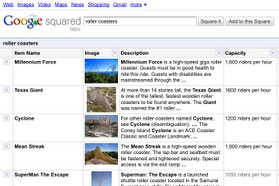Google looks for answers with Squared
New Labs tool Google Squared scours the internet for answers, rather than just pages.


Sign up today and you will receive a free copy of our Future Focus 2025 report - the leading guidance on AI, cybersecurity and other IT challenges as per 700+ senior executives
You are now subscribed
Your newsletter sign-up was successful
Forget Wolfram Alpha as a Google killer how about Google Squared as the Wolfram Alpha killer?
Google Labs has released a new search tool that lines up data from across the web in a chart for easy comparison. So like Wolfram Alpha, it looks to give answers, rather than pages.
"Google Squared is an experimental search tool that collects facts from the web and presents them in an organized collection, similar to a spreadsheet," wrote Alex Komoroske, associate product manager for Google Squared, in the official blog.
"If you search for roller coasters, Google Squared builds a square with rows for each of several specific roller coasters and columns for corresponding facts, such as image, height and maximum speed," he wrote.
Clicking on any piece of information will show its source as well as other statistics pulled from the site. The "squares" can be edited and saved for later, too.
"This technology is by no means perfect," admitted Komoroske. "That's why we designed Google Squared to be conversational, enabling you to respond to the initial result and get a better answer."
"If there's another row or column you'd like to see, you can add it and Google Squared will automatically attempt to fetch and fill in the relevant facts for you," he said. "As you remove rows and columns you don't like, Google Squared will get a fresh idea of what you're interested in and suggest new rows and columns to add."
Sign up today and you will receive a free copy of our Future Focus 2025 report - the leading guidance on AI, cybersecurity and other IT challenges as per 700+ senior executives
There are differences between Wolfram Alpha's computational knowledge engine and Google Squared, however. Wolfram Alpha pulls its answers from a human-edited database, while Google's tool uses what's already on the web.
"While gathering facts from across the Internet is relatively easy (albeit tedious) for humans to do, it's far more difficult for computers to do automatically," Komoroske explained.
Watch the Google video below for more on the new experimental tool, or try it for yourself here.
Click here for our review of Wolfram Alpha.
Freelance journalist Nicole Kobie first started writing for ITPro in 2007, with bylines in New Scientist, Wired, PC Pro and many more.
Nicole the author of a book about the history of technology, The Long History of the Future.
-
 Palo Alto Networks CEO hails ‘the end of identity silos’ as firm closes CyberArk acquisition
Palo Alto Networks CEO hails ‘the end of identity silos’ as firm closes CyberArk acquisitionNews Palo Alto Networks' CEO Nikesh Arora says the $25bn CyberArk acquisition heralds "the end of identity silos" for customers, enabling them to supercharge privileged access management.
-
 Google says hacker groups are using Gemini to augment attacks
Google says hacker groups are using Gemini to augment attacksNews Google Threat Intelligence Group has shut down repeated attempts to misuse the Gemini model family
-
 Google looks to shake up the way the tech industry classifies skin tones
Google looks to shake up the way the tech industry classifies skin tonesNews The tech giant is pursuing better ways to test for racial bias in tech products
-
 DuckDuckGo vs. Google: Privacy or popularity?
DuckDuckGo vs. Google: Privacy or popularity?Vs Google may reign as king, but it’s not the only option in the world of search
-
 How to change your search engine in Microsoft Edge
How to change your search engine in Microsoft EdgeTutorials If you'd rather search through Google than Bing, here's how to change your default search provider in Windows 10's new browser
-
 Google's top 2014 search trends revealed
Google's top 2014 search trends revealedNews Google 2014 trends have been unveiled, and include the year’s biggest sporting events, tech releases, cat stats and more
-
 Google declares Amazon its biggest search rival
Google declares Amazon its biggest search rivalNews Google has dubbed Amazon its biggest rival above other traditional search engine companies
-
 EU demands more concessions from Google over search dominance
EU demands more concessions from Google over search dominanceNews Google gets another chance to end probe
-
 Bing's search now includes academic research
Bing's search now includes academic researchNews Scholarly articles will also be featured in Microsoft's Cortana Personal Assistant
-
 UK demands EU drops right to be forgotten law
UK demands EU drops right to be forgotten lawNews The government has asked for the right to be forgotten law to be removed from new European Union data protection laws
